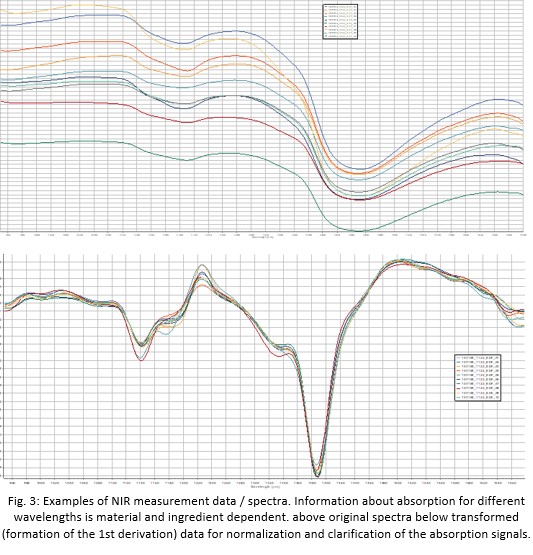Application Note: NIR Measurement of refuse derived fuels: Part 2
6. Typical applications of NIR spectroscopy for RDF
NIR systems process a reflection signal and absorbance information for different wavelengths (fig. 3). This material and ingredient dependent data can be used to determine different properties:
- Determination of calorific value: NIR spectroscopy can determine the calorific value of RDF materials, which is of central importance for energy production.
- Foreign Substance Identification: The method enables the detection of unwanted contaminants or non-combustible components in the RDF materials.
- Moisture content: NIR spectroscopy can measure the moisture content of RDF materials to optimize combustion efficiency.
- Sorting and classification: RDF materials can be sorted using NIR spectroscopy and classified according to their composition and energy content.

7. Best practices for measuring RDF materials using NIR spectroscopy:
- Calibration: Precise calibration of the NIR spectrometer is essential to achieve accurate measurement results.
- Representative Samples: Choosing representative samples for calibration and validation ensures reliable analytical data.
- Clean surfaces: The samples to be analyzed should be free of contamination in order to obtain correct measurement results.
- Periodic Validation: Regular validation of NIR spectroscopy by comparison to reference methods is important to verify accuracy.
- Data Analysis: Implement appropriate data analysis techniques to extract meaningful information from the NIR spectra, such as chemometric models and multivariate analysis.
8. Conclusion
NIR spectroscopy is a powerful technique for measuring RDF. Their ability to be non-invasive, efficient and environmentally friendly makes them a valuable tool for quality control and process optimization in waste-to-energy. Through careful calibration and adherence to best practices, NIR spectroscopy can help support the transition to sustainable and resource-efficient energy generation.
